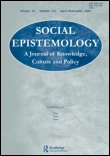
Access provided by University of North Texas
Social Epistemology: A Journal of Knowledge, Culture and PolicyVolume 23, Issue 3-4, 2009Special Issue: US National Science Foundation's Broader Impacts Criterion |
|||

Broad Impacts and Narrow Perspectives: Passing the Buck on Science and Social Impacts
- DOI:
- 10.1080/02691720903364019
pages 183-198
- Published online: 23 Dec 2009
Abstract
We provide a critical assessment of the National Science Foundation’s (NSF) “broader impacts criterion” for peer review, which has met with resistance from the scientific community and been characterized as unlikely to have much positive effect due to poor implementation and adherence to the linear model heuristic for innovation. In our view, the weakness of NSF’s approach owes less to these issues than to the misguided assumption that the peer review process can be used to leverage more societal value from research. This idea, although undoubtedly well‐meaning, is fundamentally flawed. Retooling or refining the Broader Impacts Criterion does not alter the fact that conventional peer review, based on specialized scientific and technical expertise, is not up to the task of ensuring adequate judgements about social impact. We consider some possible alternative approaches to providing greater social impact in science and include in our assessment past and current efforts at NSF and throughout the federal research establishment that address, in some cases having addressed for decades, the intentions and goals of the Broader Impacts Criterion, albeit using alternate mechanisms. We conclude that institution‐building and explicit and targeted policy‐making are more useful and democratically legitimate approaches to ensuring broad social impacts.
Keywords
Related articles
View all related articlesFirst page preview
Sorry, you do not have access to this article.
How to gain access:
Recommend to your librarian that your institution purchase access to this publication.
Log in
If you already have an individual subscription, please log in using your Taylor & Francis Online ID to gain access.
Librarians
- Librarians' area
- Pricing
- Institutional account
- Access entitlements
- Co-branding
- IP ranges
- Link resolver preferences
- Usage reports




